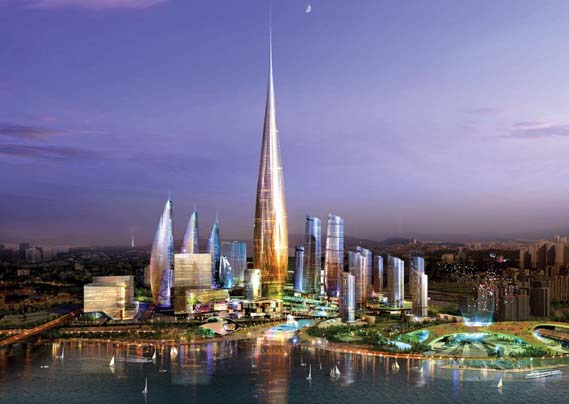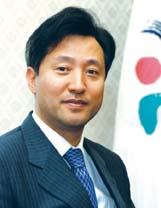Seoul's Manhattan
Samsung-NPS consortium named developer
of mammoth Yongsan Int'l Biz Area project
 Korea Railroad Corp. (Korail) has finally selected the developer of its Yongsan International Business Area Development Project, which includes a 152-story tall building.
Korea Railroad Corp. (Korail) has finally selected the developer of its Yongsan International Business Area Development Project, which includes a 152-story tall building.
The Yongsan International Business Area Development Evaluation and Management Committee announced on Nov. 2 that the consortium of Samsung Corp. and the National Pension Service won the contract for the project by bidding 28 trillion won to develop the entire designated area in the Yongsan Ward of Seoul, which encompasses some 3.17 million square meters including 356,420 square meters of land owned by Korail.
Director Lee Kyung-taik of Samsung Corp. said it will easily be the largest such single development project in the world in terms of space and investment.
Real estate brokers in Seoul agree that the Yongsan complex will now lead the real estate market in the country, along with the Gangnam area in southern Seoul, awed by tall buildings, a glittering hotel and shopping malls to be built inside the business district.
 The winning consortium will now have to sign official contracts with Seoul City and Korail by March of next year before officially launching the mammoth project.
The winning consortium will now have to sign official contracts with Seoul City and Korail by March of next year before officially launching the mammoth project.
Seoul City still has to designate the adjacent areas to be included in the huge project. The projected cost is almost twice what was estimated for the new administrative city being built in South Chungcheong Province.
The consortium includes 17 construction firms led by Samsung Construction, GS E&C, POSCO Construction and SK Construction, all major Korean builders with extensive construction experience both at home and overseas.
The four financiers of the project are the National Pension Service, Prudential Insurance, Samsung Life Insurance and Woori Bank.
The list of prospective buyers and occupants of the buildings in the international business area includes Prudential Insurance for office spaces up to 661,000 square meters, the National Pension Service (165,000 square meters), and Samsung Group, among others.
Tubman Inc. of the United States wants to rent 453,000 square meters of space for a shopping mall,
 ING Galleria wants 99,000 square meters and Lotte Mart is interested in 44,000 square meters.
ING Galleria wants 99,000 square meters and Lotte Mart is interested in 44,000 square meters.
The complex will allot 55 percent of its space for business offices with 13 office buildings to be built, 20 percent for shopping malls and commercial areas, 14 percent for residential areas, hotels and lodging facilities will account for 6.5 percent and cultural and convention areas will take up 4.5 percent.
The biggest attraction will be the 152-storey tall Dream Tower, some 620 meters tall, planned to be the world's second tallest building after Burj Dubai, which will be 700 to 800 meters tall when completed. Dream Tower will house financial, IT and tourism centers. Samsung's Lee said he thinks that the structure might still go higher to draw from what Seoul City officials were talking about during the approval process for the project. He said the lower part of the building will be designated for offices, the middle part luxury hotels and the high levels for upscale residences with hotel services, similar to the plans for the Burj Dubai.
Samsung Group affiliates, Prudential Insurance and Mirae Asset will be among the major occupants or owners of Dream Tower and, therefore, are busy looking for an appropriate site inside the complex for the building.
There will also be 12 other business buildings of between 20 and 70 stories tall. CJ and KT&G are on the list of potential buyers of those buildings for rental operations. Rents for those office buildings are expected to be the highest in the country; more than those charged at the Finance Center in Gwanghwamun in downtown Seoul and the Gangnam Finance Center in southern Seoul. They will be about 150 percent of those currently charged at buildings near the new complex in Yongsan, similar to the pricing of the Roppongi area in Tokyo, for example.
Director Lee said foreign companies like IBM and Oracle have shown an interest in moving into the complex, drawn by its location and traffic conditions around the area.
Samsung Group affiliates might take up offices in Dream Tower as Director Lee said the consortium wants to have top business firms move into the famous structure including those now located in the Gangnam area in southern Seoul.
Shopping malls in the complex are also drawing quite a bit of attention with Tubman Inc. and ING out to lease the malls for subleasing to shop owners or for direct operations. Lotte Mart, one of the largest supermarket chains and Donghwa Duty-Free Shop are interested in taking up space in the mall.
For hotel operations, Four Seasons and the Mandarin hotel chains have already expressed an interest to operate six-star hotels in the complex.
There will also be seven luxury residential and commercial buildings from 20 to 50 stories high.
According to the consortium, it plans to build 2,000 apartment units for residents of Seobuicheon-dong, an area to be included in the complex on the bank of the Han River and 500 units for general residents who want to take up residence in the complex.
According to Director Lee, the cost of an apartment will be some 29 million won per 3.3 square meters (one pyeong) for a 35 pyeong or 115 square meter apartment.
The biggest obstacle in making the project a success is the high prices for land. In their bid, the consortium wrote down 7,405 won per pyeong for land owned by Korail, which takes up about 63 percent of the entire land required for the projected complex. It has to buy private land located nearby the complex because 37 percent of the land needed for the complex has yet to be secured and land prices have skyrocketed lately.
What it will pay for the privately owned land is the big question. People close to the consortium said the developer might have to build more business and commercial facilities inside the complex to secure funds to pay for the land in private hands.
The projected complex includes land in nearby Seobuicheon-dong, which is 63,171 square meters in total space. It currently contains 1,635 apartment units, 493 duplex apartments and 23 houses, in addition to 39 multi-family apartments.
The Samsung-National Pension Service consortium beat the consortium of Hyundai E&C and Prime Group in clinching the mammoth project, which is so large that it is likely to change the face of the construction industry. One of the reasons is that the 17 construction companies participating in the Samsung consortium stand to make huge profits from the building project.
The building cost alone would be around 9 trillion won and Samsung Construction will do some 32 percent of the building work. Still, each construction firm is likely to make several hundred billions of won for their services, considering the huge scale of building work involved in the project.
Industry sources said construction firms with the Samsung consortium would be making so much money from the project that it will change the rankings of Korean construction firms as those firms that joined the losing consortium, such as Hyundai and Daelim, will be left out. nw
(counterclockwise) Seoul Mayor Oh Se-hoon; An aerial view of the design of Yongsan International Business Area project; A bird's eyeview of Yongsan International Business Area.
3Fl, 292-47, Shindang 6-dong, Chung-gu, Seoul, Korea 100-456
Tel : 82-2-2235-6114 / Fax : 82-2-2235-0799